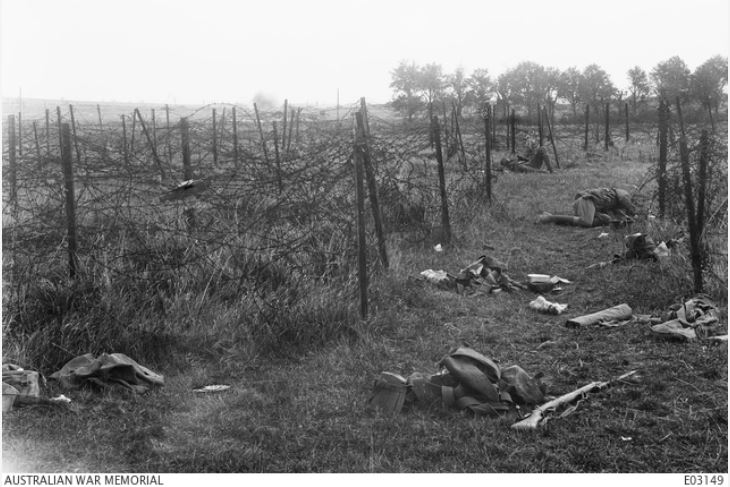Difference between revisions of "53rd Battalion"
From Our Contribution
(→Battalion Personnel) |
|||
| Line 23: | Line 23: | ||
===Battalion Personnel=== | ===Battalion Personnel=== | ||
| − | * [[ | + | * [[Francis William Singleton]] Medical Corps, attached 3 Dec 1916 - 21 May 1917 |
| − | |||
===Battle Honours=== | ===Battle Honours=== | ||
Revision as of 00:34, 11 March 2021
 Shoulder patch | |
 2 Sep 1918 The gap in the tangled barbed wire, through which some of the 53rd Australian Battalion advanced AWM E03149 | |
Contents
Brief History
The 53rd Battalion was initially raised in mid-February 1916 as part of the expansion of the all-volunteer First Australian Imperial Force (1st AIF) that took place in Egypt during World War. Formed from reinforcements sent from Australia and experienced men drawn from the 1st Battalion, the 53rd was assigned to the 14th Brigade, 5th Division.
After training while defending the Suez Canal from attack by the Ottoman forces, the battalion was moved to France in June 1916 where they took their place in the trenches along the Western Front. Their first involvement in the fighting came at the Battle of Fromelles on 19–20 July 1916. The 53rd suffered 600 casualties at Fromelles. Nevertheless, the battalion remained at the front for the next two months, before being withdrawn for a rest. During 1917, after the Germans withdrew to the Hindenburg Line to shorten their lines of communication and free up reserves, the 53rd Battalion took part in the brief Allied pursuit, culminating in them being committed to hold the ground won during the Second Battle of Bullecourt.
In 1918 he Australian divisions were brought south to the Somme to help blunt the German Spring Offensive. The 53rd Battalion manned defensive positions to the north of Villers-Bretonneux, holding their positions even though the town fell into German hands during the Second Battle of Villers-Bretonneux. It later fought at Péronne, and during the Battle for Mont Saint-Quentin where William Currey was awarded the Victoria Cross. Their final action was during the Battel of St Quentin Canal. In March 1919 it was briefly merged with the 55th Battalion, before being disbanded on 11 Apr 1919. 647 men lost their lives while posted to this unit, and a further 1,647 were wounded in action.
Battalion Personnel
- Francis William Singleton Medical Corps, attached 3 Dec 1916 - 21 May 1917
Battle Honours
8 Albert, 1918
- Amiens
- Ancre, 1918
- Bullecourt
- Egypt, 1916
- France and Flanders, 1916-18
- Hindenburg Line
- Menin Road
- Mont St. Quentin
- Passchendaele
- Poelcappelle
- Polygon Wood
- Somme, 1916, 1918
- St. Quentin Canal
- Villers Bretonneux
- Ypres, 1917
Individual Honours
- 1 x Victoria Cross
- 4 x Distinguished Service Order
- 1 x Offer of the Order of the British Empire
- 25 x Military Cross
- 3 Bar to Military Cross
- 28 x Distinguished Conduct Medal
- 76 x Military Medal
- 4 x Bar to Military Medal
- 4 x Meritorious Service Medals
- 20 x Mentioned in Despatches
Notes